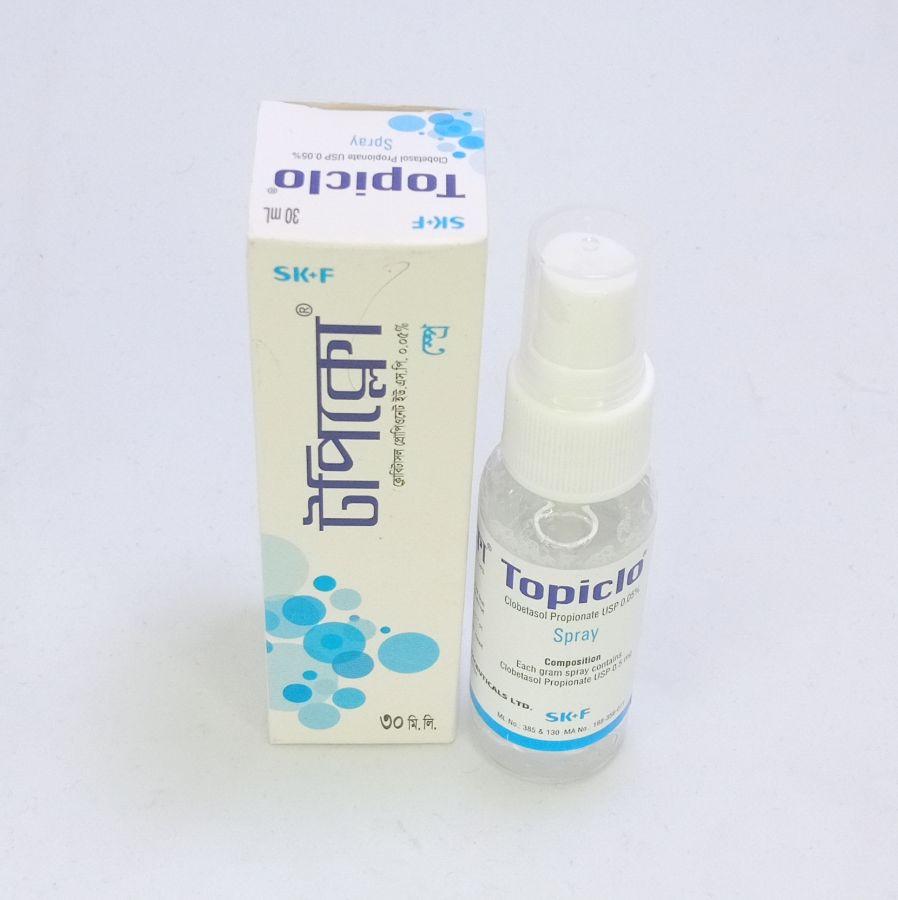
Type:30ml bot
Generic Name:Clobetasol Propionate 0.05% topical
Manufacturer:Eskayef Pharmaceuticals Ltd.
Price:৳200.00
Corticosteroid-responsive Dermatoses, Psoriasis, Scalp Psoriasis, Plaque-type Psoriasis, Vitiligo, Eczema, Alopecia areata, Herpes labialis, Lichen sclerosus, Lichen, Mycosis fungoides, Corticosteroid-responsive dermatoses
Corticosteroid-responsive Dermatoses Cream: Apply thin layer to affected areas q12hr and rub in gently and completely; not to exceed 50 g/week Scalp Psoriasis Shampoo: Apply thin film to dry scalp qDay; leave in place for 15 min; add water, lather, and then rinse thoroughly Moderate to Severe Plaque-type Psoriasis Cream/lotion: Apply to affected area in scalp q12hr for up to 2 weeks if area is less than 10% of the body surface area; not to exceed 50 g/week
<12 years Safety & efficacy not established >12 years Corticosteroid-responsive Dermatoses Cream: Apply thin layer to affected areas q12hr and rub in gently and completely; not to exceed 50 g/week Scalp Psoriasis Shampoo: Apply thin film to dry scalp qDay; leave in place for 15 min; add water, lather, and then rinse thoroughly Moderate to Severe Plaque-type Psoriasis Cream/lotion: Apply to affected area in scalp q12hr for up to 2 weeks if area is less than 10% of the body surface area; not to exceed 50 g/week
Childn <12 yrs. Long-term treatment of ulcerative conditions, rosacea, pruritus; It is contraindicated in rosacea, acne vulgaris, perioral dermatitis, primary cutaneous viral infections (eg. herpes simplex, chickenpox), otitis externa with a perforated eardrum, hypersensitivity to the preparations. Scalp application is contraindicated in infection of the scalp.
Clobetasol is a very potent corticosteroid used in short-term treatment of various inflammatory skin conditions. Corticosteroids decrease inflammation by stabilizing leukocyte lysosomal membranes, preventing release of destructive acid hydrolases from leukocytes; inhibiting macrophage accumulation in inflamed areas; reducing leukocyte adhesion to capillary endothelium; reducing capillary wall permeability and edema formation; decreasing complement components; antagonizing histamine activity and release of kinin from substrates; and reducing fibroblast proliferation, collagen deposition, and subsequent scar tissue formation.
Long-term continuous topical therapy should be avoided where possible, particularly in infants and children, as adrenal suppression can occur readily even without occlusion. If used in childhood, or on the face, courses should be limited to 5 days and occlusion should not be used. If applied to the eyelids, care is needed to ensure that the preparation does not enter the eye. If used in psoriasis careful patient supervision is important. Scalp Application: Keep away from eye. Flammable. Do not use or dry the hair near a fire or flame. Scalp Shampoo: Do not use on areas other than the scalp. Keep away from eye. Lactation: Excretion in milk unknown; use with caution
Perioral dermatitis, striae esp in flexures. Dermal and epidermal atrophy esp on the face, steroid purpura. Burning, Cracking/fissuring of the skin, Erythema, Folliculitis, Irritation, Numbness, Pruritus, Stinging, Hypopigmentation (high potency topical steroids) Potentially Fatal: Prolonged usage of large amount of clobetasol propionate can lead to sufficient systemic levels to produce adrenal suppression, Cushing's syndrome, diabetes and hypertension.
Pregnancy Safety data on clobetasol in pregnant woman is not available Published data report a significantly increased risk of low birthweight with the use of greater than 300 grams of potent or very potent topical corticosteroid during a pregnancy Advise pregnant women of the potential risk to a fetus and to use clobetasol on the smallest area of skin and for the shortest duration possible In animal reproduction studies, increased malformations (eg, cleft palate and skeletal abnormalities), were observed after SC administration of clobetasol to pregnant mice and rabbits Lactation No information is available regarding the presence of clobetasol in breast milk or its effects on the breastfed infant or on milk production Systemically administered corticosteroids appear in human milk and could suppress growth, interfere with endogenous corticosteroid production, or cause other untoward effects Unknown whether topical administration of clobetasol could result in sufficient systemic absorption to produce detectable quantities in human milk To minimize potential exposure to the breastfed infant via breast milk, use clobetasol on the smallest area of skin and for the shortest duration possible while breastfeeding Advise breastfeeding women to avoid applying clobetasol directly to the nipple and areola to prevent direct infant exposure
Increased systemic exposure w/ CYP3A4 inhibitors (eg ritonavir & itraconazole).